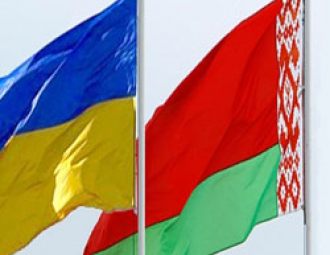Opinion:Ukraine-EU Association Agreement means Belarus is last bastion of Russia in Europe

Recently Ukrainian Prime Minister completed his visit to Belarus, where he tried to find common ground with Lukashenka, a likely advocate for Kyiv in its relations with Russia, writes Ryhor Astapenia.
Alexander Lukashenka, surprisingly, has reacted favourably to the European aspirations of Ukraine and has not joined in in Moscow's economic war against Kyiv. Economic relations between Belarus and Ukraine are developing rapidly; trade over the last four years has grown 2.5 times. The two countries, however, still have economic claims against each other.
With Kyiv's support, Lukashenka wants to show his significance to the Kremlin and get from the Russian leadership even more concessions.
However, Minsk and Kyiv will not continuously play against Moscow. The countries are developing in opposite directions, so their mutual interests are not often aligned.
How Lukashenka assisted Kyiv
Belarus and Ukraine have rapidly intensified their relations. Prime Minister of Ukraine Mykola Azarov`s most recent visit was the third high-level meeting between the two countries in the last six months. This time Ukraine needed a meeting more than Belarus. As Russia tries to prevent signing of the Association Agreement with the EU, Ukraine is trying to come to an understanding with Belarus.
Despite the reputation of being the Kremlin`s vassal, Lukashenka has been showing respect towards the European aspirations of Ukraine. Lukashenka called the Russian reaction to Ukraine's signing of the Association Agreement too politicised and assured the Ukrainians that he does not see any issues in Ukraine's movement towards cooperation with the European Union. Moreover, Lukashenka said that even if Ukraine joins NATO, it will change nothing in the relationship between the two countries.
Alexander Lukashenka himself has removed one barrier to Ukraine's integration with Europe. Following the restoration of their respective independence in 1991, the two states had not agreed on their borders until a few months ago. Belarus refused to ratify the State Border Treaty and demanded from Ukraine repayment of a $134m debt.
It seems that Ukraine has not returned this loan, yet the parties have found another solution. This summer Belarus' head of state gave Yanukovich the ratified treaty. Thanks to this ratified document, Ukraine has solved all of its problems with its borders and may move forward with its visa liberalisation plans with the EU. Belarus will establish its first border demarcation sign with Ukraine in November of this year.
Belarus has also not been participating in the Kremlin`s war against Ukrainian products. At a time when Chief Sanitary Inspector of Russia Gennady Onischenko “found” carcinogens in Ukrainian candies from the confectionary company Roshen, the Belarusian authorities stated that the Ukrainian candies met Belarusian standards.
Doing business with Ukraine
Lukashenka is not the kind of person to help someone without getting something in return. Some of the political support he is offering is largely due to the economic success of Belarus in its relations with Ukraine. This country remains the third largest economic partner of Belarus, and the positive trade balance of Belarus in its relations with Ukraine increased eight-fold from 2009 to 2012. Petroleum products and agricultural equipment remain the main strong points of the Belarusian export to Ukraine.
Foreign Trade between Belarus and Ukraine ($ millions)

In 2012 Ukrainian businessmen invested more that $350m in Belarus. Motor Sich's purchase of a controlling stake of the Vorsha aircraft repair plant remains the most substantial bargain reached between the two countries. During Azarov's visit, the Ministries of Industry of Belarus and Ukraine signed a roadmap for cooperation for 2013-2015.
Generally, the economic relations between the states are rather unclear, since each country is liable to launch a trade war against the other at any moment. A further point to consider is both countries' black markets, where each country competes with the other.
With the help of Ukraine, Lukashenka's regime protects Belarus' access to Ukrainian markets. Belarusian petroleum products occupy about 40 per cent of the market. Ukrainian authorities planned to begin an anti-dumping investigation against Belarus, but in the end decided not to open it. It could be speculated that the trade-off came in the form of receiving the official border demarcations or the political support of Minsk in Ukraine's dealings with Moscow.
Belarus and Ukraine will not unite against the Kremlin
This time around Lukashenka showed his geopolitical flexibility and did not openly oppose European integration of Ukraine. This is not necessarily a part of some anti-Russian policy, but rather an attempt to increase Belarus' own value to Russia. Even the possibility of the emergence of good chemistry between Belarus and Ukraine causes a nervous reaction from the Kremlin.
Political scientists often discuss a potential alliance between Minsk and Kyiv against the imperialist policy of the Kremlin. However, such an alliance today looks impossible. Each country has taken very different geopolitical paths, while economic relations have led to many conflicts, and the political elites of these countries are not well connected to each other. Just this year Lukashenka called the Ukrainian leadership "a lousy one.”
Belarus built the best political ties with Ukraine during its dialogue with the EU in 2008-2010. At that moment, Belarusian state media ceased slinging mud at former President Viktor Yushchenko and Lukashenka even had several meetings with him. However, that relationship quickly ended.
Russia has always been a third invisible party in relations between Belarus and Ukraine. Thanks to Ukraine's anti-Kremlin policy, Russia was often more willing to make concessions to the Lukashenka regime. Today, these relations are going through changes. If Ukraine signs this Association Agreement with the EU, Belarus will become the last bastion of Russia in Europe. This is precisely the reason why the Kremlin will do its best not to lose Belarus and its own imperial status by continuing to bankroll Lukashenka`s dictatorship.
-
03.01
-
07.10
-
22.09
-
17.08
-
12.08
-
30.09








































